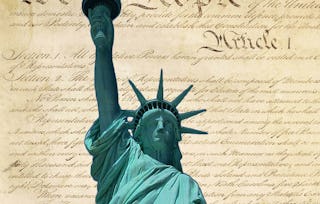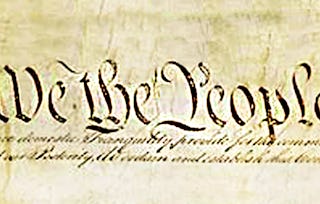This course will highlight the construction and interpretation of the U.S. Constitution through the centuries. You'll learn the history behind the Constitution, cases that formed important precedent, and how changes in interpretation have been dependent on shifts in cultural and political climate as well as the composition of the Supreme Court.

Gain next-level skills with Coursera Plus for $199 (regularly $399). Save now.

Chemerinsky on Constitutional Law - The Structure of Government

Instructor: Erwin Chemerinsky
15,248 already enrolled
Included with
(97 reviews)
Skills you'll gain
Details to know

Add to your LinkedIn profile
See how employees at top companies are mastering in-demand skills

There are 7 modules in this course
What's included
2 videos3 readings
In this module, we'll examine two facets of the critical question, "Why the Constitution?" First we'll answer the question, "what functions does the Constitution perform?" We'll then consider the question, "why achieve these functions in the form of a written Constitution?"
What's included
5 videos1 reading1 assignment1 peer review
What is the authority of judicial review? Why is it important? If the federal judiciary can declare a statute or action unconstitutional, what checks are there on this power? These are several of the questions we will endeavor to answer in this module.
What's included
7 videos1 reading1 assignment1 peer review
In this module we will consider three major questions: 1.How did McCullough vs. Maryland shape the power of the legislature? 2. What are the major powers of the Congress under the Constitution? 3. To what extent do states limit the power of the Congress?
What's included
8 videos1 reading1 assignment
The central questions in this module are: 1. When can a president act without express Constitutional or Congressional authority? 2. What are the Constitutional problems posed by the federal administrative agencies? 3. What is the authority of the President with regard to foreign policy?
What's included
5 videos1 reading1 assignment
The goal of this module is to consider two important ways that the power of states are kept in check by the federal government: preemption and the dormant commerce clause.
What's included
2 videos1 reading1 assignment1 peer review
As the course draws to a final close, we would like to thank you for your participation.
What's included
2 readings
Instructor

Offered by
Explore more from Law
 Status: Preview
Status: PreviewUniversity of California, Irvine
 Status: Preview
Status: PreviewUniversity of Pennsylvania
 Status: Preview
Status: PreviewYale University
 Status: Preview
Status: PreviewYale University
Why people choose Coursera for their career




Learner reviews
97 reviews
- 5 stars
87.62%
- 4 stars
10.30%
- 3 stars
0%
- 2 stars
0%
- 1 star
2.06%
Showing 3 of 97
Reviewed on Sep 19, 2018
See my notes from part 2 of this course. Excellent course from a very experienced attorney and professor.
Reviewed on Sep 5, 2022
Excellent pace, amount of information and expectations of someone new to constitutional law!
Reviewed on Jan 18, 2022
while this is a good course, if your are a middle/high school student the assignments will be very difficult and the lectures will be hard to understand.
Frequently asked questions
To access the course materials, assignments and to earn a Certificate, you will need to purchase the Certificate experience when you enroll in a course. You can try a Free Trial instead, or apply for Financial Aid. The course may offer 'Full Course, No Certificate' instead. This option lets you see all course materials, submit required assessments, and get a final grade. This also means that you will not be able to purchase a Certificate experience.
When you purchase a Certificate you get access to all course materials, including graded assignments. Upon completing the course, your electronic Certificate will be added to your Accomplishments page - from there, you can print your Certificate or add it to your LinkedIn profile.
Yes. In select learning programs, you can apply for financial aid or a scholarship if you can’t afford the enrollment fee. If fin aid or scholarship is available for your learning program selection, you’ll find a link to apply on the description page.
More questions
Financial aid available,
¹ Some assignments in this course are AI-graded. For these assignments, your data will be used in accordance with Coursera's Privacy Notice.





